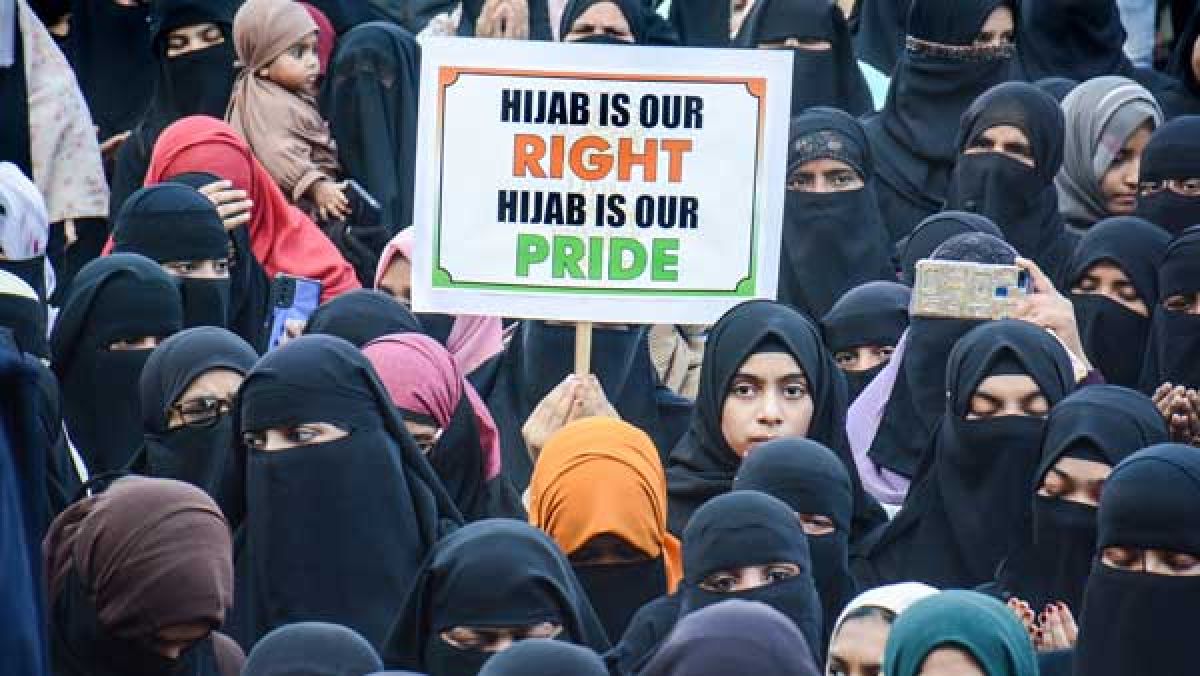
This article is written by Miss Rani Balkrishna Yadav, 2nd year LLB student from Parvatibai Jondhale Womens Law College
INTRODUCTION
Hijab ban is a controversial issue that has been initiated in Karnataka in the month of December 2021. The word Hijab is an Islamic word that means pardah i.e Separation, a curtain/veil. The term hijab had no interrelation in the Quran with formal or traditional wear of an Islamic women basically because of the evolution and mistranslation of the text the term Hijab is now used to describe the wearing of clothes for females. The terminology hijab was used approximately 5-7 times in the quran but it never stated it for females it was said that Hijab to be used while speaking with the wife of the prophet which indicates patriarchy and sacred of the private life of the Prophet nothing here states or commands every Islamic women to adopt a hijab. Although misreference led to a state & currently a national topic for which interim order is passed but judgement is yet pending before the Karnataka High Court.
BEGINNING OF THE HIJAB BAN CONTROVERSY
The current sensitive and crucial issue had begun in the beginning of December 2021 when a group of girls of the government PU college in udupi were restricted to enter the college stating that hijab won't be allowed in the classrooms due to which the girls began to protest from 31st December about the denial into the classrooms from past 15 days. Udupi's MLA who heads the college's development committee arranged a meeting with the parents stating to wear the uniforms in the classrooms. Rumours go around that the community began stating and comparing the hijab wearing to turbans of the Sikh religion which is a sacred part of it. Comparisons to Bhagwa scarf of the Hindus were also stated in the arguments. The group who went on strikes and carried on rallies were incessant about the comparison with holy wearings of another caste simultaneously quoting that hijab is mandatory Islamic wear for women's as per instructions in Quran. On 5th February 2022, the government of Karnataka had issued that uniforms must be worn compulsory on the premises to which there won't be any exception made for wearing of hijab. On 8th February 2022 the government of karnataka issued for clouser of high schools & colleges as the hijab ban intensified the state. The quazi or members of the holy mosque also instructed the islamic women's to not step out from their irrespective home's and if they do they should wear an hijab also the community pronounced to mark the protest day as "Hijab Day", to which the local police administered the situation over it.
HIJAB IN ACCORDANCE WITH QURAN
Let's clearly understand the terminology hijab and the times it has been stated along with a few purposes of its statement.
1. Surah 24:31- To the women's to guard their genitalia and draw their Khimār over their bosoms - which generally means to protect or cover their private parts with a khimar ( a scarf type cloth) over their bosoms i.e (the shoulder up to chest).
2. Quran 33:53 - Oh you who have believed, do not enter the house of the Prophet except when you are permitted for a meal, and when you ask (his wife) for something ask them from behind a separation (Hijab)
3. It is not granted to any mortal that God should speak to him except through revelation or from behind a veil. ( sepration by a pardah)
4. In chapter 24 verse - 30 known as Nur i.e (the light) Allah commands the Prophet Muhammad, as follows - " Say to the believing men that: they should cast down their glances and guard their private parts (by being chaste). This is better for them". In the verse, the Islamic men are instructed not to look towards other women rather than their wives with a lustful intention instead cast their visions downward which is known as ( Hijab of the eye).
Above we have stated few verses where precisely the term & its purpose is explained. There are a few more commands in regards to it but it seems to be not a mandatory obligation to wear it at every social location a women head towards. Also as societal, institutional or governmental norms, we are supposed to alter/adapt ourselves in accordance for smooth functioning & maintenance of the professional decorum simultaneously avoids regulating unnecessary disputes over a nominal matter.
Also, a media professional of Pune had stated it is the absolute choice of the individual to wear a hijab or not however, it is wrong to enforce a choice (either making it mandatory to wear or absolute banning of wear). Because which Hijab is being compared with Turbans of the Sikh to which the governer of Kerela quoted that is a shameful moment hearing the two garments being compared to each other where the turbans of Sikh is a religious symbol. Further added the whole conspiracy is to derail the progress of the Islamic women have established, quoting that the niece of the wife of the holy Prophet who was young and beautiful had said that I want people to see my beauty and the grace of god in me and thank god for it this is how the generation back then behaved.
ORDER PASSED BY KARNATAKA HIGH COURT / GOVERNMENT & CORRESPONDENCE ARGUMENTS / RESPONSE
The Karnataka committee had passed a diktat that instructed that no students will be allowed to wear a scarf, shawl, hijab or any religious flag within the classrooms.
The interim order passed by HC also restrained the students irrespective to their religion from wearing any religious symbol until further orders. It said that the order “is confined to such institutions wherein the College Development Committees have prescribed the student dress code/ uniform”. Senior advocate Kamat argued that the court cannot suspend its duty of protecting fundamental rights by citing public order issues. That India is a secular country and under article 19 (a) freedom to the right of speech and expression
The former advocate general of Karnataka argued that the college development council which is empowered by the Karnataka government on a decision of wearing a uniform is compulsory or not as the government has not prescribed uniforms for colleges until now.
The full bench of Karnataka which was hearing the case on the hijab ban rejected the affidavit which stated that the interim order passed by the court was being misused by the college authorities stopping entrance to girls wearing hijab in institutions where no prescribed uniform is implemented. The Bench comprising Chief Justice Ritu Raj Awasthi, Justice Krishna S Dixit and Justice J M Khazirejected the affidavit sworn to by Advocate Mohammad Tahir by saying that a counsel cannot file an affidavit and that the same has to be sworn to by the party. As a lawyer cannot swear to an affidavit. We will not allow such malpractice.
A girl from Karnataka had approached the supreme court challenging the interim order passed by the HC to which the urgent hearing of the petition was dismissed. CJI NV Ramana sir further stated " Don't spread these things to a national level. We will interfere only at an appropriate time. " while declining the hearing.
The government of Karnataka reiterated hijab is not an essential religious practice regardless of which nothing shall be followed inside the institution. The ban on hijab was only for signifying & maintaining the institution decorum to which students were not prohibited to wear it on campus or outside. A practice that is affirmed to be indispensable must be mandatory, not discretional. A statement by Dr B.R Ambedkar in the constituent assembly " Let us keep the religious institutions outside the educational institution " AG Navadgi quoted.
In the end, Advocate General argued on the behalf of the state government stating " Women cannot be subjected to a compulsion to wear any dress".
The right as per constitution validity pursuant to Article - 19 (1)(a) all citizens shall have the right to freedom of speech and expression. But Article 19(2) of the Constitution authored the government to impose, by law, reasonable restrictions upon the freedom of speech and expression in the interests of public order.
Hereby, breaking down the subclause we observe & conclude India as a democratic country has never imposed restrictions on any caste, religion to disobey or outlook it's traditional practises or faith the only ground to be nurtured is nothing should harm or cause a breach of peace, riot, degradation of others belief or depriving the constitutional validity.
CONCLUSION
Encouraging only women to wear a distinct garment in the name of religious or traditional practice cannot be considered a fundamental right. Although we live in a democratic country succeeding our faith & personal uncoded religious law don't attest one can deprive the constitutional provisions or disobey any institution guidelines. To maintain a healthy balance between both it's necessary for one to co-relate in order to distinguish their faith from societal norms failing to which today the state and country alongside is facing the critical issue and abstained from doing their fundamental duties. Encouraging such issues or arguments is almost similar to abetting/enraging a community in a personal war-like situation. Wearing any garments is not abstained or abolished by the Central or State government one can wear it in their homes or society as they wish but if it's mandatory to follow a uniform civil code at a distinct place then one should acknowledge and respect the guideline and if there is a disagreement then avoid it by carrying out to another place.
The one's claiming and backing up the hijab ban issue and forcing women to wear it in the name of personal law are the ones who are depriving/ abstaining to wear any other garments of their choice if they wanted to, failing to which a fear maybe attached of being boycotted by the community or punishment by god. The government or judiciary would never conclude any judgment which would create a hassle or disappointment among peers one should keep in mind. Here we conclude or judge on the basis of our well structured or codified law not according to feelings, emotions or personal views. The country ought to align with the basic structure of the constitution instead of being biased and selfish.





0 Comments